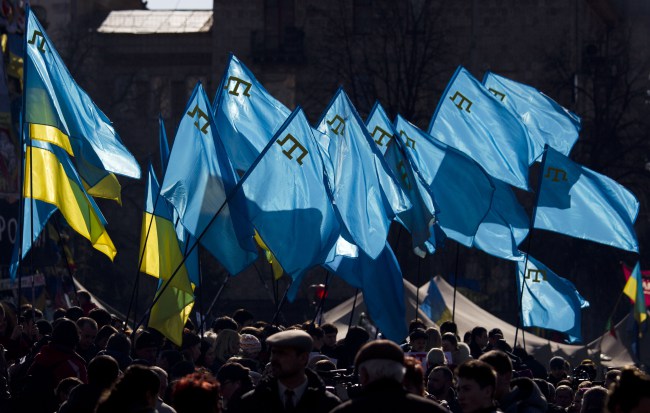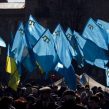
Would Kyiv Create a Crimean Tatar Battalion?
Publication: Eurasia Daily Monitor Volume: 11 Issue: 206
By:

Ukrainian President Petro Poroshenko and Mustafa Cemilev, the longtime leader of the Crimean Tatar national movement who now serves as the presidential plenipotentiary representative for Crimean Tatar affairs, have been discussing the possibility of creating a Crimean Tatar Battalion within the Ukrainian army. This battalion could take part in operations against the secessionist, Moscow-backed militants in Donetsk and Luhansk. No decision has yet been made about such a unit, which would unite, under one commander, the approximately 450 Crimean Tatars now serving in the Ukrainian military. And it is entirely possible that nothing will come of these discussions (utro.ru, November 13).
In announcing these discussions to the press, Cemilev said that the names of the Crimean Tatars serving in the Ukrainian army must be kept secret because their relatives in occupied Ukraine have been subjected to pressure of various kinds. He said that such a unit would inspire the Crimean Tatar nation and attract additional political and financial support to the Ukrainian effort. And the Crimean Tatar leader expressed his personal confidence that, together with other Ukrainian units, it would be “able to liberate Crimea.”
Given the immediate threat Ukraine is facing from Russian forces, it is not clear how high on its list of priorities Kyiv holds the formation of such a battalion. There are obvious pluses and minuses to such a step. On the plus side, the formation of such a unit would call attention to the loyalty Crimean Tatars have shown to Ukraine and underscore the commitment of both that nation and the Ukrainian people to end the Russian occupation of the peninsula. Moreover, it would certainly attract more volunteers from among the Crimean Tatar nation, whose numbers are now being oppressed by the occupying authorities and who would view participation in such a unit as the best possible way to contribute to the national cause. And it could very well attract new financial contributions to the Ukrainian cause from businessmen and others. Indeed, such contributions have been an important, if unheralded, source of support for the hard-pressed Ukrainian military.
But there are also minuses to such a step that Kyiv must certainly consider. There is no tradition of ethnic units in the post-Soviet Ukrainian army—although there is one from tsarist times. To create this type of special unit for the Crimean Tatars, however exceptional their case may be, would be to set a precedent that other minorities might like to copy and that Kyiv would be reluctant to disappoint by not agreeing to form units for them as well. That could create a command-and-control problem within the ranks and even provide training to some groups that might want to use it later to challenge Ukrainian control. Moreover, even if this policy of forming national units was limited to the Crimean Tatars, that alone could create problems of military cohesion within larger military formations.
However, the biggest “minus” in such a step would likely be in Crimea itself. The Russian occupation authorities, who are already oppressing the Crimean Tatars (see EDM, September 23), would certainly use the existence of such a force to argue that the Crimean Tatars are “dangerous militants” who represent a threat to “Russian territorial integrity.” The Russian government on the peninsula would, thus, likely invoke such claims as justification for new restrictions and expanded mistreatment of the Crimean Tatar community. While such “justifications” would not actually be justifiable, it is tragically the case that Moscow and its proxies in Crimea would have some success with those elements in Russia and the West always willing to credit what the Russian side says, however outrageous it may be.
Indeed, it is not unthinkable that even some Crimean Tatars would oppose the formation of such a unit—not because they have accepted Moscow’s rule of the Ukrainian peninsula as somehow legitimate, but rather because of fear of the way in which the occupation authorities would exploit this against them. Moreover, some Crimean Tatars would see it as a threat to the image their nation has long cherished: as a peaceful people who will not use violence to achieve their ends.
Unquestionably, Crimean Tatars will continue to serve with distinction in the Ukrainian military: After all, their homeland is occupied, and they have every reason to support Ukraine’s efforts to expel the Russian forces. But it is likely to be the case that, at the end of the day, Kyiv will decide that it is better to have such people leavening the ranks of other units than to organize a separate Crimean Tatar Battalion. An ethnic battalion such as this could certainly pose serious risks for the Crimean Tatar nation and the Ukrainian people more generally, of which its members are a part.




